
Sylvia Plath was an American poet, novelist, and short story writer. She is credited with advancing the genre of confessional poetry and is best known for The Colossus and Other Poems (1960), Ariel (1965), and The Bell Jar, a semi-autobiographical novel published shortly before her suicide in 1963. The Collected Poems was published in 1981, which included previously unpublished works. For this collection Plath was awarded a Pulitzer Prize in Poetry in 1982, making her the fourth to receive this honour posthumously.

Doris May Lessing was a British novelist. She was born to British parents in Iran, where she lived until 1925. Her family then moved to Southern Rhodesia, where she remained until moving in 1949 to London, England. Her novels include The Grass Is Singing (1950), the sequence of five novels collectively called Children of Violence (1952–1969), The Golden Notebook (1962), The Good Terrorist (1985), and five novels collectively known as Canopus in Argos: Archives (1979–1983).
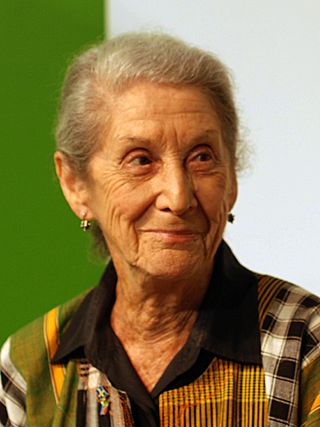
Nadine Gordimer was a South African writer and political activist. She received the Nobel Prize in Literature in 1991, recognized as a writer "who through her magnificent epic writing has ... been of very great benefit to humanity".
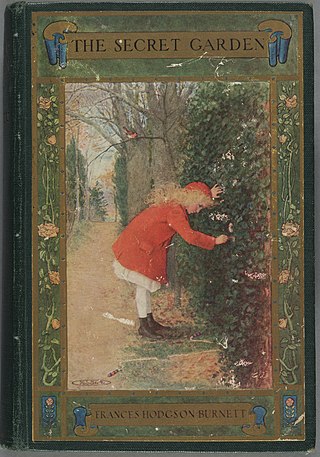
The Secret Garden is a novel by Frances Hodgson Burnett first published in book form in 1911, after serialisation in The American Magazine. Set in England, it is one of Burnett's most popular novels and is seen as a classic of English children's literature. Some of Burnett's other popular novels include Little Lord Fauntleroy, The Lost Prince and A Little Princess. Several stage and film adaptations have been made of The Secret Garden. The American edition was published by the Frederick A. Stokes Company with illustrations by Maria Louise Kirk and the British edition by Heinemann with illustrations by Charles Heath Robinson.
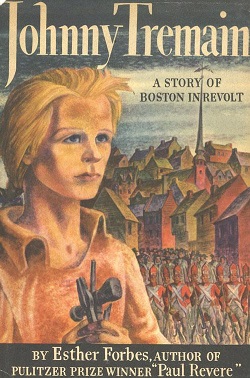
Johnny Tremain is a work of historical fiction written in 1943 by Esther Forbes that is set in Boston prior to and during the outbreak of the American Revolution. Intended for teen-aged readers, the novel's themes include apprenticeship, courtship, sacrifice, human rights, and the growing tension between Patriots and Loyalists as conflict nears. Events depicted in the novel include the Boston Tea Party, the British blockade of the Port of Boston, the midnight ride of Paul Revere, and the Battles of Lexington and Concord.

The Secret Garden is a 1993 fantasy drama film directed by Agnieszka Holland, executive-produced by Francis Ford Coppola and distributed by Warner Bros. under their Family Entertainment imprint. Starring Kate Maberly, Heydon Prowse, Andrew Knott, John Lynch and Maggie Smith, the film's screenplay was written by Caroline Thompson, based on the 1911 novel of the same name by Frances Hodgson Burnett. The novel was previously adapted in 1919 and 1949.
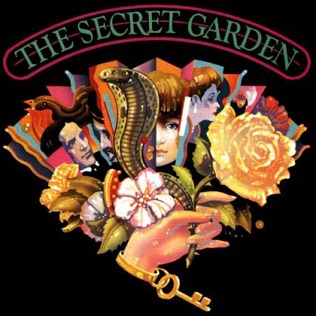
The Secret Garden is a musical based on the 1911 novel of the same name by Frances Hodgson Burnett. The musical's script and lyrics are by Marsha Norman, with music by Lucy Simon. It premiered on Broadway in 1991 and ran for 709 performances.

Why Didn't They Ask Evans? is a work of detective fiction by Agatha Christie, first published in the United Kingdom by the Collins Crime Club in September 1934 and in the United States by Dodd, Mead and Company in 1935 under the title of The Boomerang Clue. The UK edition retailed at seven shillings and sixpence (7/6) and the US edition at $2.00.
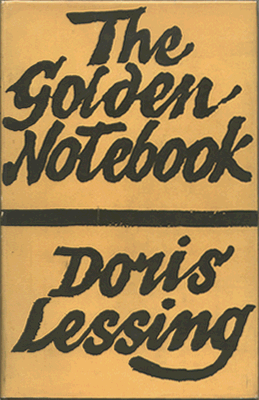
The Golden Notebook is a 1962 novel by the British writer Doris Lessing. Like her two books that followed, it enters the realm of what Margaret Drabble in The Oxford Companion to English Literature called Lessing's "inner space fiction"; her work that explores mental and societal breakdown. The novel contains anti-war and anti-Stalinist messages, an extended analysis of communism and the Communist Party in England from the 1930s to the 1950s, and an examination of the budding sexual revolution and women's liberation movements.

The Memoirs of a Survivor is a dystopian novel by Nobel Prize-winner Doris Lessing. It was first published in 1974 by Octagon Press. It was made into a film in 1981, starring Julie Christie and Nigel Hawthorne, and directed by David Gladwell.
The Amazing Mrs Pritchard is a British drama series that aired on BBC One in 2006. Produced by Kudos, it was written by Sally Wainwright and stars Jane Horrocks in the title role of a woman with no previous political experience who becomes Prime Minister of the United Kingdom.

That Cold Day in the Park is a 1969 psychological thriller film directed by Robert Altman and starring Sandy Dennis. Based on the novel of the same name by Richard Miles and adapted for the screen by Gillian Freeman, it was filmed on location in Vancouver, British Columbia, where the events occur. The supporting cast includes Michael Burns, Luana Anders, John Garfield Jr., and Michael Murphy. The picture was screened at the 1969 Cannes Film Festival outside of the main competition.

The Four-Gated City, published in 1969, is the concluding novel in British Nobel Prize-winning author Doris Lessing's five-volume, semi-autobiographical series The Children of Violence, which she began, in 1952, with Martha Quest. In The Four-Gated City Lessing moves the setting from Zambesia, a fictionalized version of Southern Rhodesia, to London. Martha "is integrally part of the social history of the time - the Cold War, the Aldermaston Marches, Swinging London, the deepening of poverty and social anarchy." The novel extends into science fiction, depicting a dystopian future following the destruction of Britain.
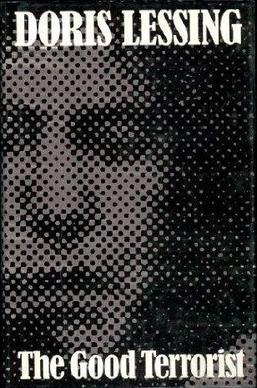
The Good Terrorist is a 1985 political novel written by the British novelist Doris Lessing. The book's protagonist is the naïve drifter Alice, who squats with a group of radicals in London and is drawn into their terrorist activities.

Soul Mountain is a novel by Gao Xingjian. The novel is loosely based on the author's own journey into rural China, which was inspired by a false diagnosis of lung cancer. The novel is a part autobiographical, part fictional account of a man's journey to find the fabled mountain Lingshan. It is a combination of story fragments, travel accounts, unnamed characters, and folk poetry and legends. An English version translated by Mabel Lee was published in the United States on December 5, 2000.

The Southern Rhodesia Communist Party was an illegal, underground communist party established in Southern Rhodesia which was formed in large part due to the minority settler rule, which had an immensely repressive structure. It emerged in 1941 from a split in the Rhodesia Labour Party. The party consisted of a small, and predominantly white, membership. During the parties existence it had links to other communist parties such as the Communist Party of South Africa and the Communist Party of Great Britain. The party disappeared in the late 1940s, with the exact date of its dissolution not being known. Nobel Laureate Doris Lessing author of various works including “The Grass is Singing,” is the most well known member of the Southern Rhodesian Communist Party.
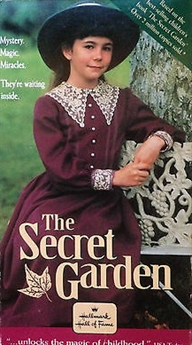
The Secret Garden is the 1987 Hallmark Hall of Fame made-for-television film adaptation loosely based on Frances Hodgson Burnett's 1911 novel The Secret Garden, aired on CBS November 30, 1987 and produced by Rosemont Productions Limited. The film stars Gennie James, Barret Oliver, Jadrien Steele, Billie Whitelaw, Michael Hordern, and Sir Derek Jacobi. It won a Primetime Emmy Award in 1988 for Outstanding Children's Program.
For the Term of His Natural Life is a 1983 Australian three-part, six-hour television miniseries based on the classic 1874 novel of the same name by Marcus Clarke. Each episode aired for two hours on Nine Network on 23 May, 30 May and 6 June 1983.

The Secret Garden is a 1975 British television adaptation of Frances Hodgson Burnett's 1911 novel of the same name. Adapted, produced and directed by Dorothea Brooking, it was first broadcast on BBC 1 in seven 30-minute episodes. This is the only BBC adaptation of the novel known to exist in its entirety. The 1952 adaptation is missing all eight episodes and the 1960 adaptation is missing three of its eight episodes.

The 2007 Nobel Prize in Literature was awarded to the British novelist Doris Lessing (1919–2013) as "that epicist of the female experience, who with scepticism, fire and visionary power has subjected a divided civilisation to scrutiny." Lessing was the oldest person ever, at age 88, to receive the Nobel Prize in Literature followed by the German historian Theodor Mommsen, who received the prize at age 85. She is also the third-oldest Nobel laureate in any category. She became the 11th woman to be awarded the prize.


















